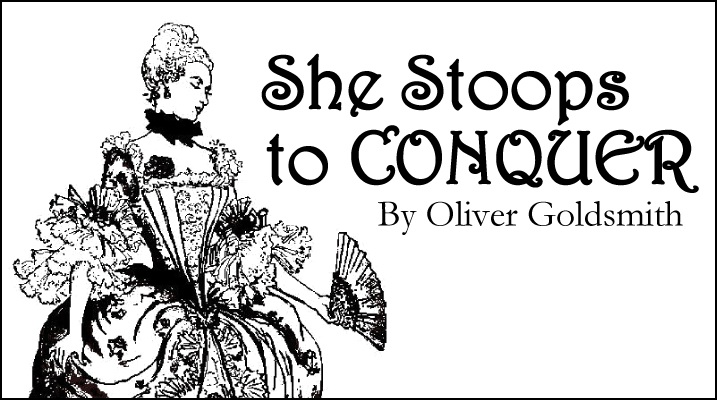Teaching Oliver Goldsmith’s She Stoops to Conquer last week reminded me of the time I first encountered it in high school English. At that time I found it to be one of the most delightful plays I had ever read. Looking back, I now have a better sense of why I liked it so much.
Like the male protagonist Marlow, I was painfully shy. Forced to talk to Kate Hardcastle, Marlow becomes tongue-tied, although he is perfectly easy when interacting with lower class women. My students noted that they experience a similar split: anxious about interrelating with members of the opposite sex, they find that lowering themselves through alcohol lessens inhibitions and loosens tongues.
Part of the reason for my own shyness was a horrendous case of acne, which prompted me to pull into myself. I actually remember talking to a girl once the way Marlow talks to Kate: I looked at her shoes the entire time. The other side of such reserve is that, when one does enter society, one says all the wrong things. Marlow orders his future father-in-law around in the mistaken belief that he is an innkeeper. In my own case, I would blurt out witticisms that were meant to be funny but were obnoxious instead.
Goldsmith was similarly inept. The famous actor David Garrick, in a mock epitaph, wrote of him,
Here lies Nolly Goldsmith, for shortness called Noll,
Who wrote like an angel, but talked like poor Poll.
Marlow’s shyness takes him into his worst nightmare: he becomes the laughing stock of everyone on stage, including the woman he is trying to impress. Here she is twisting the knife after he realizes that she is not a servant but the woman he couldn’t face:
HARDCASTLE. It means that you can say and unsay things at pleasure: that you can address a lady in private, and deny it in public: that you have one story for us, and another for my daughter.
MARLOW. Daughter!—This lady your daughter?
HARDCASTLE. Yes, sir, my only daughter; my Kate; whose else should she be?
MARLOW. Oh, the devil!
MISS HARDCASTLE. Yes, sir, that very identical tall squinting lady you were pleased to take me for (courtseying); she that you addressed as the mild, modest, sentimental man of gravity, and the bold, forward, agreeable Rattle of the Ladies’ Club. Ha! ha! ha!
MARLOW. Zounds! there’s no bearing this; it’s worse than death!
MISS HARDCASTLE. In which of your characters, sir, will you give us leave to address you? As the faltering gentleman, with looks on the ground, that speaks just to be heard, and hates hypocrisy; or the loud confident creature, that keeps it up with Mrs. Mantrap, and old Miss Biddy Buckskin, till three in the morning? Ha! ha! ha!
MARLOW. O, curse on my noisy head. I never attempted to be impudent yet, that I was not taken down. I must be gone.
Normally I would have found such an embarrassing scene so painful that I would have turned away, even though it is meant to be comic. Comedy, intended to relieve anxieties, can become painful when the anxieties are too intense. There is such good humor in She Stoops to Conquer, however, just as there is in Goldsmith’s novel The Vicar of Wakefield, that I felt safe. Maybe I drew courage from the way that Marlow is able to laugh at himself in the end:
Joy, my dear George! I give you joy sincerely. And could I prevail upon my little tyrant here to be less arbitrary, I should be the happiest man alive…
My students noted that Goldsmith’s neo-Restoration comedy seems less abrasive, but also less profound, than the Restoration comedies of William Wycherley and Aprha Behn. This is true. But we all agreed that there is a vital need for such a warm-hearted and forgiving play. After all, it can bolster even the painfully shy.
